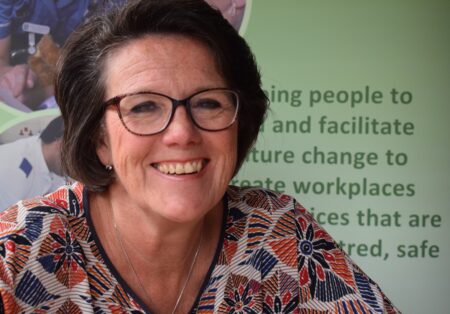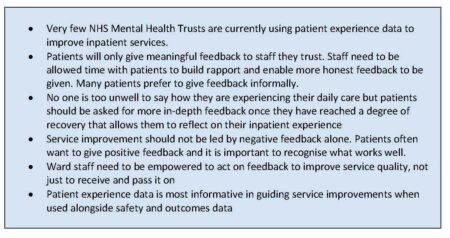Home News & Views Making a case for investment in using patient experience to drive change
Making a case for investment in using patient experience to drive change

Jo Odell, Practice Development Facilitator, FoNS
A recent report about the EURIPIDES study that is being promoted by the Patient Experience Library highlights the importance of using patients experiences along side safety data within mental health trusts.
They highlight several key findings from this study. The Executive Summary says:

I would also highly recommend watching the short video that accompanies that main findings.
My experience tells me this report is relevant across many health and social care organisations and really highlights FoNS’s fundamental philosophy of listening to everyone’s experiences, both staff and patients/people who use services and using this to improve care. This is really implicit in our Creating Caring Cultures model.
This report also highlights the need for clinical teams to be supported and equipped by their organisations with the skills, confidence and time to gather this experience and use it to improve care. This challenges the current status quo where organisations usually have a patient experience lead and team, but their role is to gather data, analyse it and use it to prove that care is safe to the board of directors and external inspectors like CQC, rather than use it to create a culture of improvement. Clinical teams do need support to make changes, but their genuine involvement and participation are what will develop more caring cultures and make meaningful change possible.
One of the important last points this report makes is about how to help make patient experience processes cost effective. The researchers undertook an economic assessment which showed that an investment in meaningful gathering of patient experience resulted in cost savings in relation to reduced rates of violence, faster discharge and improved staff morale. In other words, for the patient feedback processes to be cost effective it is vital that feedback is acted on in meaningful ways to enable change. Now is the time for all health and social care organisations to view gathering patient and staff experiences as an investment rather than a tick box exercise and for clinical teams to believe in the power of feedback and act on this. Demonstrating the value of the way we work will also provide powerful arguments for the key stakeholders in all these processes but especially the ones who hold the financial purse strings.
If you want to know more about undertaking an economical assessment to make an argument for investment, take a look at the RCNi website.
You might also like to look at my blog on the Friends and Family Test.
Comments are closed.

